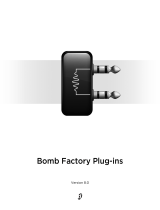
2
Welcome to compressor wonderland!
First of all, we would like to thank you for picking the xpressor
500 as your new dynamics tool - a very good choice indeed.
We believe this module is the most versatile stereo compres-
sor available in API’s 500 series format. With its many unique
features taken from our agship products, you not only get
great compression, but an amount of control on processing
which has yet to be experienced elsewhere.
No matter if you want to set and forget or plunge deep into
the secrets of compression, the xpressor 500 is for you. Its dis-
crete audio path running in constant class-A mode provides
a superior audio quality which combines a clear and open
sound with a good lot of punch.
Stereo buss compression, processing single signals, approach-
ing dynamics in creative ways – the xpressor 500 shines in
many dierent applications. Best of elysia? You got it!
Index
Compatibility . . . . . . . . . . . . . . . . . . . . . . . . . . . . . . . . . . . . . . . . . . . . . .3
Installation . . . . . . . . . . . . . . . . . . . . . . . . . . . . . . . . . . . . . . . . . . . . . . . .3
Controls . . . . . . . . . . . . . . . . . . . . . . . . . . . . . . . . . . . . . . . . . . . . . . . . . . .4
Connectors . . . . . . . . . . . . . . . . . . . . . . . . . . . . . . . . . . . . . . . . . . . . . . . .6
Auto Fast . . . . . . . . . . . . . . . . . . . . . . . . . . . . . . . . . . . . . . . . . . . . . . . . . .7
Log Release . . . . . . . . . . . . . . . . . . . . . . . . . . . . . . . . . . . . . . . . . . . . . . . .8
Warm Mode . . . . . . . . . . . . . . . . . . . . . . . . . . . . . . . . . . . . . . . . . . . . . . .9
Negative Ratios . . . . . . . . . . . . . . . . . . . . . . . . . . . . . . . . . . . . . . . . . . 10
Gain Reduction Limiter . . . . . . . . . . . . . . . . . . . . . . . . . . . . . . . . . . . 11
Appendix . . . . . . . . . . . . . . . . . . . . . . . . . . . . . . . . . . . . . . . . . . . . . . . . 12


















